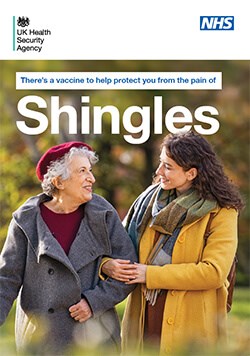
Shingles
Royal Voluntary Service and the NHS work together to encourage people to get protect themselves from the pain of shingles.
The following information explains how you can help protect yourself as part of the national shingles programme, the benefits of the vaccine and who is eligible. There are two shingles vaccines, Zostavax and Shingrix. Your GP practice or local pharmacy will advise which is the right vaccine for you.
We hope that people with concerns about shingles, carers and families, find this guide useful. Download a copy of Shingles leaflet in full, to give to someone you know.
For alternative formats or other languages visit healthpublications.gov.uk, or call 0300 123 1002 or by textphone 0300 123 1003 (lines are open 8am to 6pm Monday to Friday).
Protect yourself from the pain of shingles
Unlike most other infections, you don’t catch shingles from someone else. Most of us had chickenpox when we were young, although some of us will not be aware that we’ve had it.
After you have chickenpox, the virus remains dormant living in the nerves. For most of your life you will not be aware of this, but from time to time the virus can come back and spread to the skin causing a disease called shingles.
Shingles can be very painful and tends to affect people more commonly as they get older. This can be because your immune system is weakened by increasing age, by stress or by a range of medical conditions and treatments. For some, the pain caused by shingles can last for many years. Shingles can really affect your life, stopping you from doing all the things you usually enjoy.
What causes shingles?
Shingles (also known as herpes zoster) is caused by the dormant chickenpox virus spreading to an area of skin served by one of the nerves. It results in clusters of extremely painful and itchy, fluid-filled blisters. These blisters can burst and turn into sores that eventually crust over and heal. These blisters usually affect an area on one side of the body, most commonly the chest, but sometimes also the head, face and eye.
How long does it last and how serious can it be?
The first signs of shingles can be feeling generally unwell with a tingling or burning feeling in an area of skin on one side of the body. A painful rash with fluid-filled blisters usually appears a few days after the initial symptoms.
Shingles on the body can cause severe pain. If shingles develops in the eye and eyelid, it can lead to decreased vision or even permanent blindness in that eye.
How common is shingles?
About one in five people who have had chickenpox will develop shingles. This means that every year in England and Wales, tens of thousands of people will have shingles. Although shingles can occur at any age, the risk, severity and the complications of shingles all increase with age.
Post-herpetic neuralgia (PHN)
Each year, about 14,000 people go on to develop post-herpetic neuralgia (PHN) after shingles and over 1,400 are admitted to hospital because of PHN.
Most people recover fully after a few weeks, but for some, the pain goes on for several months or even years – this is called post-herpetic neuralgia (PHN). This is a particularly unpleasant condition with severe burning, throbbing or stabbing nerve pain.
The older you are, the more likely you are to have long-lasting pain. The shingles vaccine reduces the risk of getting shingles and PHN.
Can shingles spread?
Shingles does not spread as easily as chickenpox, but the fluid in the blisters does contain the chickenpox virus. So someone who is not immune to chickenpox can catch the infection if they are in contact with this fluid.
If you have a shingles rash you should cover the rash with loose clothing to reduce the risk of spreading chickenpox. Pregnant women who have not had chickenpox, people with a weakened immune system and newborn babies should avoid direct contact with the rash.
Who will get the vaccine?
From 1 September 2023 the vaccine programme is being offered to the following:
- healthy people 70 to 79 years of age who have not yet been vaccinated
- people from 50 years of age with a severely weakened immune system
- healthy people aged 60 to 70 years will become eligible for the vaccine over the next 5 years, when they turn 65 or 70 years of age.
You will remain eligible for the shingles vaccine until your 80th birthday (unless you have a weakened immune system - People with a severely weakened immune system remain eligible for vaccine), but the sooner you have the vaccine the earlier you will be protected. Details of who can get the vaccine in the first five years of the programme are shown in the chart.
What about people who are under the eligible age for shingles vaccine?
Younger people will be offered the vaccine when they reach the eligible age.
Shingles can occur at any age but the risk, severity and complications increase with age. Those with severely weakened immune systems are at higher risk and that is why the vaccine is recommended at an earlier age.
Will there be any side effects?
Side effects from both Zostavax and Shingrix vaccines are usually quite mild and don’t last very long. The most common side effects (occurring in at least 1 in every 10 people): are pain and redness at the injection site, general muscle aches and headache.
You may feel tired and have a fever after Shingrix vaccine. You can rest and take the normal dose of paracetamol (follow the advice in the packaging) to help make you feel better. Do not use machines or drive if you are feeling unwell.
You should feel better after a few days but if your symptoms persist for longer, you should discuss these with your GP or practice nurse.
Zostavax can rarely cause serious side effects in people with very weakened immunity – these people should have the Shingrix vaccine instead.
You can report any side effects using the Yellow card scheme from the MHRA (yellowcard.mhra.gov.uk)
How safe are the vaccines, have they been used in other countries?
Like all licensed vaccines, the shingles vaccines have been thoroughly tested and meet strict UK safety and licensing requirements.
Both vaccines have been used extensively in Europe and north America for the last few years.
How effective is the vaccination?
By having the vaccination you will significantly reduce your chance of developing shingles.
If you do go on to develop shingles the symptoms are likely to be milder and the illness shorter than if you had not had the vaccination. Both of the shingles vaccines used in the UK have been shown to provide good protection.
How and when is the vaccine given?
Like most vaccinations, the vaccine will be given as an injection in your upper arm. There are two different vaccines available, and you will be offered the vaccine that is right for you.
Shingrix is a non-live vaccine and you will need 2 doses to give you the best longer lasting protection.
For most people the second dose of Shingrix will be offered from about six months after the first dose. If you have a severely weakened immune system your second dose of Shingrix should be given earlier, but at least 8 weeks after dose one.
Your GP practice will let you know when to book for the 2nd dose.
Zostavax is a live vaccine and only a single dose is required to give you good protection.
Why can’t I get the vaccine now?
Under the current programme, everyone from 70 to 79 years of age is eligible for shingles vaccine. The programme is being extended gradually, starting with those at highest risk, as recommended by the Joint Committee Vaccination Immunisation (JCVI). Over the next 10 years, the programme will eventually include all those from 60 years of age.
Individuals age 50 years or older with a severely weakened immune system are already eligible for the Shingrix vaccine.
Do I need to do anything to get the vaccination?
When you become eligible for your shingles vaccine your GP surgery will contact you to book an appointment. However, if you are worried about shingles you should contact your GP surgery for advice.
Are there people who shouldn’t have the vaccination?
There are 2 shingles vaccines available, Zostavax and Shingrix. Zostavax contains a weakened version of the live shingles virus.
People who have severely weakened immune systems, for example due to cancer treatment, should not have live Zostavax vaccine and should be offered the non-live Shingrix shingles vaccine. Your GP or practice nurse will advise whether this applies to you.
If you’ve had a severe reaction to any of the substances that go into the vaccine, you shouldn’t have it. Again, your GP practice will advise you.
The live shingles vaccine offered to those aged 70 years and above in the UK contains porcine gelatine. Some people may not want this vaccine but it is the recommended vaccine unless you cannot have it because you have a weakened immune system.
Can the vaccine give me shingles?
The Shingrix vaccines cannot give you shingles. Very rarely, Zostavax can cause a mild shingles like rash, normally around the injection site. If you develop a rash you can call NHS 111 or call your GP practice for advice.
What if I miss my vaccination? Can I have it later?
For most people the shingles vaccine will be offered until they become 80 years of age. However, if you have a severely weakened immune system, vaccine can be given up to any age.
For the best protection you should have the vaccine or complete the course at the recommended time. Contact your GP practice to make another appointment.
Am I eligible for Shingrix vaccine if I have had Zostavax before?
If you were given Zostavax as part of the routine immunisation programme when you were between 70 and 79 years of age then you do not need any further doses of shingles vaccine.
You do not need the 2-dose Shingrix vaccine now.
Can I choose which shingles vaccine to have?
No, your GP or practice nurse will offer you the vaccine that is recommended for you. You become eligible for shingles vaccine on the NHS programme depending on your age and your current medical history.
For advice and information about the shingles vaccination, speak to your GP, practice nurse or pharmacist or school immunisation team.
For more information, visit nhs.uk/shingles
Guides to support you this winter

COVID-19 vaccination programme
Take me there
Flu vaccination
Take me there
Managing minor winter ailments
Take me there
Stay safe, well & warm in winter
Please exercise your common sense when considering this guide and whether to take any of the steps that may be suggested in it. Whilst we have taken reasonable care to ensure that any factual information is accurate and complete, most of the information in this guide is based on our views and opinions (and sometimes the views and opinions of the people or organisations we work with). As a result, we cannot make any promises about the accuracy or the completeness of the information and we don’t accept any responsibility for the results of your reliance on it.

